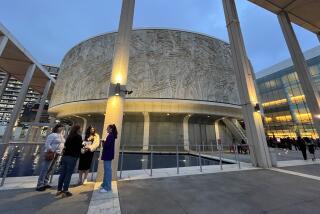Dark Nights for the Royal Shakespeare Co.
- Share via
If the commercial theaters in London’s West End are finding it hard to present new shows with popular appeal, their problems seem trivial compared to the woes of the government-funded Royal Shakespeare Company.
The RSC, with a current 2.9-million ($4.8-million) deficit, is closing its two London theaters, the Barbican and the adjacent Pit, for four months in November to cut costs.
“It seems we have no other option,” said Terry Hands, RSC artistic director and chief executive. “To stay open could risk total closure.”
The temporary shutdown of the two theaters will save 1.3 million ($2.15 million). The RSC’s annual tour of Britain’s provincial cities has also been canceled, and its current season consists of a mere 19 productions--about half the normal total.
The RSC had hoped that “A Clockwork Orange,” which did turn-away business at the Barbican in a limited run, would be a success on its transfer to a commercial West End theater. But those hopes foundered when the show closed after a month. A long “Clockwork Orange” run would have helped RSC finances considerably; its hit production of “Les Miserables” at the West End’s Palace Theatre brings in 1 million ($1.6 million) a year.
Hands noted that the RSC has an annual budget of 19 million ($31.5 million). “We receive 6 million ($9.9 million) from the government and the rest we make or raise ourselves.
“We averaged 75% capacity attendances this year as we did last year, when the average attendance at a West End play is below 50%. We are being asked to set box-office targets that demand perpetual miracles. The policy does not work.”
Hands likes to put the RSC deficit into perspective by observing that it is equivalent to what Britain “spends by the hour on defense.”
He wants Britain’s Arts Minister, Richard Luce, to raise funding levels to those recommended by the government’s own review of arts expenditures in 1984. Had the recommendations of that review been implemented, he said, the RSC would have received another 5 million ($8.3 million) in subsidy and would not be in difficulties.
In general, pleas for increased arts subsidies do not fall on sympathetic ears in Westminster. Margaret Thatcher’s Conservative government adheres strictly to a philosophy of allowing market forces to prevail--and insists arts organizations look to the bottom line in their operations.
Britain’s major subsidized arts companies--the RSC, the National Theatre, Covent Garden and the English National Opera (in order of support received)--all want future government subsidies to be linked to a cost of living index so they will not fall victims to inflation.
Their feelings are echoed by the RSC’s corporate sponsors, the Royal Insurance Company, which will give the RSC 2.1 million ($3.4 million) over the next three years--a record for a performing arts company in Britain, where corporate support for the arts has played a lesser role than in the United States.
Ian Rushton, chief executive for Royal Insurance, wants the government to pay off the deficits of all Britain’s major arts companies--which he estimates would cost 13.4 million ($22.2 million). “This would allow them to carry on with their proper artistic function,” he added.
As for Royal Insurance’s “white knight” sponsorship of RSC--which follows a previous three-year commitment of 1.4 million ($2.3 million)--Rushton insists: “It has never been the intention of Royal Insurance to provide the central core funding for the arts. That is for government.”
More to Read
The biggest entertainment stories
Get our big stories about Hollywood, film, television, music, arts, culture and more right in your inbox as soon as they publish.
You may occasionally receive promotional content from the Los Angeles Times.










